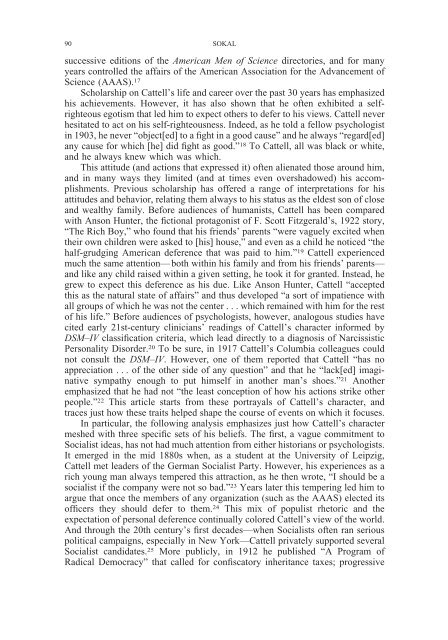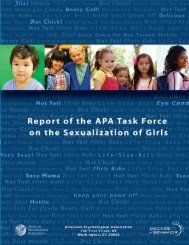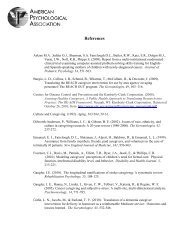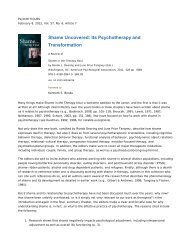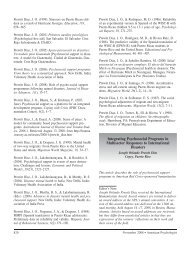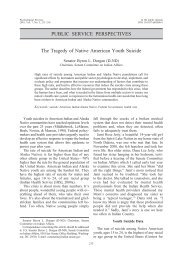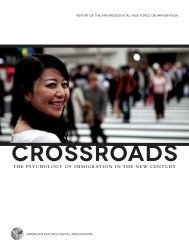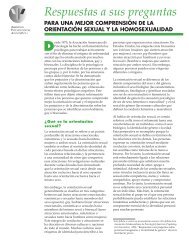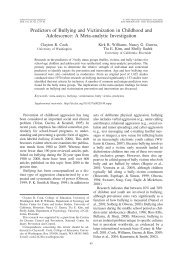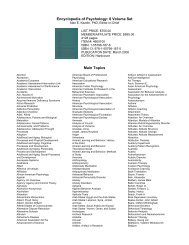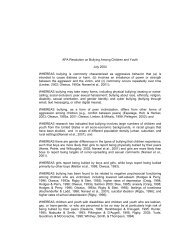James McKeen Cattell, Nicholas Murray Butler, and Academic ...
James McKeen Cattell, Nicholas Murray Butler, and Academic ...
James McKeen Cattell, Nicholas Murray Butler, and Academic ...
Create successful ePaper yourself
Turn your PDF publications into a flip-book with our unique Google optimized e-Paper software.
90 SOKAL<br />
successive editions of the American Men of Science directories, <strong>and</strong> for many<br />
years controlled the affairs of the American Association for the Advancement of<br />
Science (AAAS). 17<br />
Scholarship on <strong>Cattell</strong>’s life <strong>and</strong> career over the past 30 years has emphasized<br />
his achievements. However, it has also shown that he often exhibited a selfrighteous<br />
egotism that led him to expect others to defer to his views. <strong>Cattell</strong> never<br />
hesitated to act on his self-righteousness. Indeed, as he told a fellow psychologist<br />
in 1903, he never “object[ed] to a fight in a good cause” <strong>and</strong> he always “regard[ed]<br />
any cause for which [he] did fight as good.” 18 To <strong>Cattell</strong>, all was black or white,<br />
<strong>and</strong> he always knew which was which.<br />
This attitude (<strong>and</strong> actions that expressed it) often alienated those around him,<br />
<strong>and</strong> in many ways they limited (<strong>and</strong> at times even overshadowed) his accomplishments.<br />
Previous scholarship has offered a range of interpretations for his<br />
attitudes <strong>and</strong> behavior, relating them always to his status as the eldest son of close<br />
<strong>and</strong> wealthy family. Before audiences of humanists, <strong>Cattell</strong> has been compared<br />
with Anson Hunter, the fictional protagonist of F. Scott Fitzgerald’s, 1922 story,<br />
“The Rich Boy,” who found that his friends’ parents “were vaguely excited when<br />
their own children were asked to [his] house,” <strong>and</strong> even as a child he noticed “the<br />
half-grudging American deference that was paid to him.” 19 <strong>Cattell</strong> experienced<br />
much the same attention—both within his family <strong>and</strong> from his friends’ parents—<br />
<strong>and</strong> like any child raised within a given setting, he took it for granted. Instead, he<br />
grew to expect this deference as his due. Like Anson Hunter, <strong>Cattell</strong> “accepted<br />
this as the natural state of affairs” <strong>and</strong> thus developed “a sort of impatience with<br />
all groups of which he was not the center . . . which remained with him for the rest<br />
of his life.” Before audiences of psychologists, however, analogous studies have<br />
cited early 21st-century clinicians’ readings of <strong>Cattell</strong>’s character informed by<br />
DSM–IV classification criteria, which lead directly to a diagnosis of Narcissistic<br />
Personality Disorder. 20 To be sure, in 1917 <strong>Cattell</strong>’s Columbia colleagues could<br />
not consult the DSM–IV. However, one of them reported that <strong>Cattell</strong> “has no<br />
appreciation . . . of the other side of any question” <strong>and</strong> that he “lack[ed] imaginative<br />
sympathy enough to put himself in another man’s shoes.” 21 Another<br />
emphasized that he had not “the least conception of how his actions strike other<br />
people.” 22 This article starts from these portrayals of <strong>Cattell</strong>’s character, <strong>and</strong><br />
traces just how these traits helped shape the course of events on which it focuses.<br />
In particular, the following analysis emphasizes just how <strong>Cattell</strong>’s character<br />
meshed with three specific sets of his beliefs. The first, a vague commitment to<br />
Socialist ideas, has not had much attention from either historians or psychologists.<br />
It emerged in the mid 1880s when, as a student at the University of Leipzig,<br />
<strong>Cattell</strong> met leaders of the German Socialist Party. However, his experiences as a<br />
rich young man always tempered this attraction, as he then wrote, “I should be a<br />
socialist if the company were not so bad.” 23 Years later this tempering led him to<br />
argue that once the members of any organization (such as the AAAS) elected its<br />
officers they should defer to them. 24 This mix of populist rhetoric <strong>and</strong> the<br />
expectation of personal deference continually colored <strong>Cattell</strong>’s view of the world.<br />
And through the 20th century’s first decades—when Socialists often ran serious<br />
political campaigns, especially in New York—<strong>Cattell</strong> privately supported several<br />
Socialist c<strong>and</strong>idates. 25 More publicly, in 1912 he published “A Program of<br />
Radical Democracy” that called for confiscatory inheritance taxes; progressive


